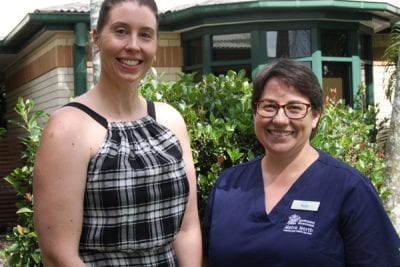
Nurse Practitioner candidates Elise Power and Ruth Brotchie
TPCH’s Internal Medicine Program has recently welcomed two Nurse Practitioner candidates.
Ruth Brotchie and Elise Power are TPCH and Metro North’s new Nurse Practitioner candidates for Delirium and Cognitive Impairment, and Palliative Care.
Ruth and Elise will work with clinical teams at TPCH to help identify how services can be developed, and design care pathways to improve the quality of life of patients they are supporting. Clinical leadership, education and research are essential components of the role with a focus on developing these areas of practice and the model of care within their service for a Nurse Practitioner.
As Nurse Practitioner candidate for Delirium and Cognitive Impairment, Ruth will work in developing expertise in assessment, diagnosis and treatment of delirium under the supervision and support the Internal Medicine interdisciplinary team, to improve outcomes for hospital patients and people in the community living with cognitive impairment, as well as their families and carers.
“The diagnosis of patients with delirium and cognitive impairment is challenging as there are many reversible causes which if diagnosed, can lead to better outcomes for our patients,” Ruth said.
“A diagnosis is critical in getting patients the care and treatment they need, so they can leave hospital sooner, and avoid rapid deterioration.
“My role will be to work with patients and educate staff to help identify what is causing the impairment and formulate a plan of action to ensure patients receive the appropriate care and follow up. It will be like being a nurse detective to see what is causing the problem for each patient.”
For Elise, the Nurse Practitioner candidate role will involve working within the Palliative Care team and collaborating with hospital and community health care professionals to improve the lives of people with a terminal illness.
“With patients now living longer, it is essential that patients can effectively manage their symptoms and live as comfortably as possible away from the hospital for as long as they can,” Elise said.
“A large part of my role will be following up with patients in the hospital and community to identify where improvements can be made to ensure they have appropriate supports in place and can achieve the best quality of life possible.
“Palliative care takes a ‘whole person’ approach to care.”